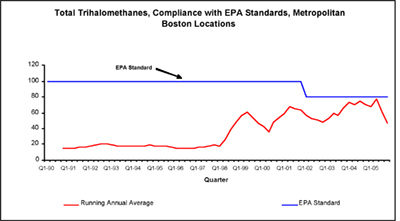(617) 788-1105, <ria.convery@mwra.state.ma.us>
With the recent start-up of the Carroll Water Treatment Plant and the use of ozone instead of chlorine for primary disinfection, the level of disinfection by-products has dropped dramatically. MWRA has always met the standards for disinfection by-products, but with ozonation, the new levels of disinfection by-products are even further below current and future standards.
Disinfection By-Products (DBPs) are formed when disinfectants such as chlorine --effectively used to control disease-causing pathogens -- mix with naturally occurring organic substances in the source water. There are several types of by-products of chlorine; trihalomethanes (THMs) and haloacetic acids (HAAs) of the most concern.
MWRA tracks the levels of DBPs in the water closely. In fact, we take more than five times as many samples as required. The present Massachusetts Department of Environmental Protection and Environmental Protection Agency standards require that the running annual average (average of past four quarters) not be over 80 ug/L for THMs and not be over 40 ug/L for HAAs. MWRA has always met this standard. Based on sampling at 16 compliance sites, disinfection by-product levels have now dropped by over 80%, with THM and HAA levels now averaging less than 10 ug/L. With the startup of the CWTP in July 2005, MWRA water now meets EPA’s recently issued standards (December 2005), 6 to 8 years ahead of the regulatory schedule.
Above is a graph of THM levels over the last 15 years. These levels were relatively low prior to 1997-1998, and rose when improved disinfection practices to inactive certain pathogens (germs) of concern. We knew that the level of disinfection by-products would rise, while we were constructing the new ozone treatment plant. With the plant on-line, can now inactivate the waterborne germs giardia and cryptosporidium, and have THM levels lower than before.
For more information on drinking water quality test results, visit our water quality test results page at <www.mwra.com/watertesting/watertests.htm> or call the MWRA Water Quality hotline: (617) 242-5323.
# # #
